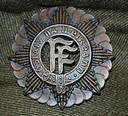Why there can’t be a European Army
Brig Gen Ger Aherne (Ret’d)
For some time, a bogeyman has inhabited the limited political and public discourse on what passes for debate and commentary in Ireland on the important issue of European security and defence. That bogeyman is the supposed ambition of EU Member States to push for the creation of a European Army. Images of involuntary conscription of Irish youth into this supposed army abound. The diversion of future EU budgets away from traditional spending areas and into security and defence spending are prevalent in this narrative.
I contend that no true ambition exists today to stand up an EU army, nor will it ever be realised, within the meaning of what it required to have a truly EU army. Yes, in the future there may well be enhanced EU military cooperation and engagement between Member States, but the standing up of an EU army, no.
My contention is based on a very simple reality, the EU as an entity does not currently have a stand-alone full spectrum intelligence capability. I strongly contend also that the EU will never be allowed by its Member States — the largest one in particular — to achieve such a capability as it would be a competitor and rival to the Member States’ own national intelligence services.
No army can be stood up and operate successfully without this full spectrum independent intelligence capability. This belief of mine has been honed from my being one of only three Defence Forces officers to date to have commanded deployed EU military forces. Functioning armies need many diverse assets, capabilities and functionality, in order to operate. A short list of such assets would include:
· command and control at the strategic, operational and tactical levels;
· troops in the front, support and rear echelons; and
· equipment, logistics, vehicles, manoeuvrability.
For any army to be secure in its planning for and execution of military operations, it is essential for it to have credible intelligence capability and resources at the strategic, operational and tactical levels. In the absence of such an independent capability, no ambition of standing up an EU army, operating as an instrument of the EU solely, would be feasible or achievable. If such a supposed army was dependent on the largesse of the intelligence capability and outputs of individual Member States in order for it to function and operate, then it could not, nor would not, achieve the mantra of being an EU army. Simple as!
Terrorist attacks in Europe and beyond in recent years are most commonly followed by commentary which suggest a need for there to be a greater collection of intelligence on would-be terrorists to prevent these attacks. It is understandable for commentary on intelligence to be ill-informed by those who are casual observers and commentators on the specialisation of what intelligence really entails. Ireland is not immune from this shallow commentary. To be pedantic; intelligence is not collected, information is collected, which, when processed, may mature into intelligence. The definition of intelligence is that it is processed information. Information is acquired from human and open sources and by electronic means.
The intelligence function is governed by what is termed The Intelligence Cycle. This Cycle is a formulated, sequential and continuous interrelated activity comprising Collection, Processing and Dissemination of the inputs, processes, analyses and outputs of that Cycle. Not all information survives the rigours of the Cycle and the eventual Disseminated product is carefully graded into a hierarchal credibility order depending on source, reliability of source(s), cross-referencing with other sources, as an example. The end product is then listed in categories from A1 downwards. It’s a tried and trusted process employed by all intelligence entities, uniformed and non-uniformed, throughout the world.
Intelligence, real intelligence, as opposed to information, is a traded commodity product, no different to traded commodity products such as coffee, sugar, rice or spices. Ireland lags well behind in this space, particularly in the international sphere. The country does not even possess Primary Radar to detect approaching hostile aerial threats. For an island nation situated in a sensitive geopolitical location, this continues to be baffling. The absence of any credible Oireachtas oversight of our two intelligence services is a primary cause of these neglects.
The recent history of EU forces deployed in countries such as Chad, the Central African Republic, Mali, Burkina Faso and Somalia is informative. It has shown up the ‘dependency’ of those EU forces on the intelligence products that certain Member States have on those countries, in order for those EU forces to operative effectively and safely in line with Force Protection needs. Those Member States do willingly and generously share their intelligence products. It is a dependent relationship, however, and one tinged with a belief that at times — understandably — national interest governs if all products are fully shared. That is not to suggest that in any shape or form have Force Protection requirements been compromised or reduced; but this reality dovetails back neatly to my earlier stated belief that unless and until the EU acquires independent full spectrum Collection, Analysis and Dissemination intelligence capability that an independent functioning EU army is not achievable. Against this reality, the concerns of the predictable Irish commentators on the bogeyman of a suggested future EU army are misplaced and ill-informed.
